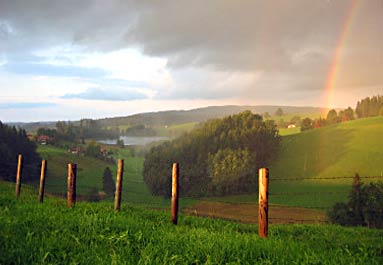This original column is provided free for one-time use with author credit at the end. It may be used for background with author credit. Copyright applies.
#125 FOR IMMEDIATE RELEASE: February 25, 2010
I smell spring, though I admit to some ambigitty
By Curtis Seltzer
BLUE GRASS, VA.—Last week, I ran into a fellow who told me: “We need to clear up the ambigitty in this situation.” He was referring to things in general—the sense in America that nothing works very well for most of us anymore, that problems don’t seem to be fixable.
I agreed. “We have more ambigitty now than we used to,” I said, “and a lot more than we can use efficiently.”
It’s easy to blame these grumbles on an iced-over January and a miserable February. But I think the winter of our discontent is actually based on the measurable truth that much of our country is sliding backwards, and much of the rest no longer quite knows how to move forward.
Yet, as I write, the sun shines on our snowpack. It’s melting, a little. I can hear it. The 10-foot-long icicle daggers are receding, one blessed drip at a time.
But for every whiff of hopey-changey, there’s a frisky-risky. If this mess melts too quickly, we will have a floody. If it refreezes, the sugar maples won’t runny. And even if it melts just right, we will soon be in mud up to our kneesie-weesies. (This column, by the way, is my application to be Sarah Palin’s head speechwriter.)
Nonetheless, our dogs, Sophie and Lucy, sense that the spring slop is coming, and rejoice. They may be Yellow Labs, but their preferred color is brown.
I see a peek-a-boo of pasture where hay has been unrolled for cattle and sheep. New calves stand forlornly in a cold, white field, puzzled by their recent evictions and why life has turned against them. It’s still not warm enough for our sugar maples to wiggle their toes.
The dogs insist on walking me to the barn when I feed the horses. If I don’t pay attention, they will roll in fresh manure, which they think is as good as it gets. If I am vigilant, they won’t try to sneak this in to our routine, but if they can get away with it, they will. They think that if I haven’t seen them do it, then they haven’t exactly done it.
I scold them with a look of silent disappointment. They tuck their tails and seek forgiveness with a phony “We’re sorry.”
I’m looking for genuine apologies these days, the kind that comes before you get caught doing it. The most I’ve heard from decision-makers -- and that rarely -- is the McNamara-Greenspan concession: “I was wrong; I made a mistake.” Most apologies are offered on the way to the woodshed in hope of a lighter hand.
We are in the third year of a man-made Recession, yet I cannot recall a single individual being disciplined, let alone prosecuted, for having had a hand in it. In contrast, hourly employees are routinely suspended or discharged for carelessness, poor judgment and negligence in the performance of their work. Why no investigations? Why no accountability? Why are there no consequences for those in the financial institutions who knew they were making a mess as they were doing it?
Apologies build on taking responsibility. I’ve yet to hear anyone admit to having any real part in the Bubble-Up Economics that produced the Recession.
Apologies are restorative. So for all the mean things I’ve said and hurtful things I’ve done over the years, I apologize to all those who know who they are.
The ambigitty of our situation got me to thinking about what still works, what we, as a people, might feel good about until warmer weather comes.
I started out writing a paragraph with: “I am unambiguously pleased with where we are on….” But I could not fill in my own blanks. Everything I thought might be mostly right seems to have either a wrong side or a good-in-theory-but-mixed-record-in-practice aspect. Maybe this is how things get in complex societies like ours.
This sniff of spring is an honest tease. It’ll be here eventually. And in the meantime, I’ll take a quickie flirt over more cold shoulder every day of the week.
I was having supper in a Pennsylvania Denny’s last week, the night before I was to hear a couple of arbitration cases. I had taken along a book that my daughter had given me, Jess Walter’s, The Financial Lives of Poets. I was about 20 pages into the story of a middle-age reporter whose middle-class life is coming apart. Everything he tries is either wrong or turns out wrong. I subsequently learned that he fails at selling financial advice online in rhyme, then starts dealing pot. Walter’s message: “The edge is so close to where we live.”
I try to be friendly to strangers. So after my waitress asked me if I wanted more coffee about 30 times, I asked her whether she was still in high school. She said that she was in a work-study program. I asked what she liked to read. “Vampire fiction,” she said. I was a little weak in this genre of modern literature, having not known that it existed until she said it. Then she said that she liked poetry. I looked at my book. Was this a sign?
I’m a sucker for kids who like writing. I said something stuffy about how it might be hard to make a living at poetry. Enough with the practical, world-weary advice. She just likes writing poetry, which is just fine in and of itself, I told myself.
I left her the book and $3 to mail it back to me when she was done. Even though Financial Lives is written well and humorous, maybe it was the wrong book for a start-up poet working her way through high school. Maybe I should apologize.
And while the country wrestles with health care, joblessness, deficits, taxes, wars, global warming and childhood obesity, the Winter Olympics appeared on television, narrowing life to one winner and everyone else, losers.
I once spent an afternoon watching these events with a teenage boy who was unable to speak or move anything more than a couple of fingers on one hand. He had graduated high school as a member of the National Honor Society.
Who had more courage—the downhill racer or this kid who opened his eyes each day?
Who deserved more credit—the winning coach or the kid’s Mom?
Modern life fills itself with more and more ambigitty. And the ambigitty these days is harder than ever to figure out. But every so often, something straight and clean appears—not two Yellow Labs certainly, but a promise of spring and a couple of teenagers who need make no apologies.
And on Wednesday, Blue Grass was told to expect another snow dump of 12 to 18 inches by Friday packaged in a “winter hurricane.”
Maybe a timely apology will stop these punishments. It’s worth a try.
Curtis Seltzer is a land consultant who works with buyers and helps sellers with marketing plans. He is author of How To Be a DIRT-SMART Buyer of Country Property at www.curtis-seltzer.com where his weekly columns are posted. He also writes for www.landthink.com.
Contact: Curtis Seltzer, Ph.D.
Land Consultant
1467 Wimer Mountain Road
Blue Grass, VA 24413-2307
540-474-3297
curtisseltzer@htcnet.org
www.curtis-seltzer.com
This original column is provided free for one-time use with author credit at the end. It may be used for background with author credit. Copyright applies.
|









